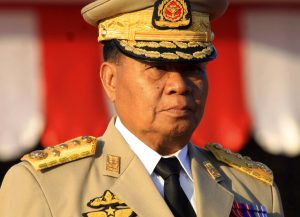Yesterday brought the news that Myanmar’s former military dictator Than Shwe has been hospitalized due to COVID-19, and is expected to remain hospitalized for two weeks. But it remains unclear whether or not the 88-year-old retired general, who ruled Myanmar from 1992 to 2011 and masterminded its transition to a tightly circumscribed form of democratic rule, has actually contracted the virus.
The Associated Press, citing a hospital employee, is reporting that Than Shwe was admitted along with his wife to the Thaik Chaung military hospital in the capital Naypyidaw, three or four days ago after they both tested positive for the disease. The employee, who unsurprisingly spoke on condition of anonymity, said the two are being treated in a VIP section of the hospital under tight security.
However, a report in The Irrawaddy yesterday claimed that the couple had been admitted simply as a precaution, given the country’s runaway COVID-19 outbreak. The pair have been vaccinated against the coronavirus, according to a senior military official quoted by the publication, and entered the hospital “to have close medical attention in case they have been infected with COVID-19.” “The old man is still alive and kicking,” the source added, “apart from his knee pain.”
Whatever the case, it testifies to the seriousness of the COVID-19 outbreak that is currently ravaging Myanmar, which has been in turmoil since February, when Than Shwe’s successor as military chief, Sen. Gen. Min Aung Hlaing, launched a coup and overthrew the democratically elected government led by Aung San Suu Kyi. The military administration, which is now calling itself a “caretaker government,” has been accused of making it worse by diverting critical medical supplies to its supporters and essentially treating much-needed oxygen canisters as contraband.
Aside from COVID-19, things looked fairly similar under Than Shwe’s two decades of rule, when he led a feared junta that brutally crushed dissent, jailed political opponents en masse, and violently repressed an uprising launched by university students and Buddhist monks in 2007.
Than Shwe also engineered the dissolution of his military government and its replacement by a new and more flexible constitutional set-up, one that historian and author Thant Myint-U has described as his “retirement scheme.” He phased Myanmar out of direct military dictatorship by introducing a constitution that allowed for multiparty elections, and released Aung San Suu Kyi from house arrest.
The purpose was to rationalize the economy, reopen Myanmar to foreign aid and investment, and extend a bridge to the West, as a counterweight to the crushing proximity of China. But the constitution of 2008 was carefully crafted to preserve the military’s central and independent role in Myanmar’s political system, as well as its control of the commanding heights of the economy.
In his 2019 book “The Hidden History of Burma,” Thant Myint-U describes this system as one in which “for the foreseeable future, until [Than Shwe] was in his afterlife, the men in charge of state violence would be men who were unreservedly loyal, protégés whom he had himself pulled up through the ranks. They would be the steel frame. They were told they were the ‘guardians’ of the new constitution.”
In the end, it was in the name of this constitution that Min Aung Hlaing enacted his February coup, claiming that his takeover was intended not to abrogate the charter but to defend it. However, the sweeping public anger that accompanied the coup, and continues to roil the country, has irrevocably shattered the delicate political pact that sustained Myanmar’s decade of limited pluralism. Going back now is not an option.
It is perhaps fitting that Than Shwe’s health is ailing just as the system he created, the culminating achievement of his two decades in the cockpit of power, enters its own terminal decline.

































